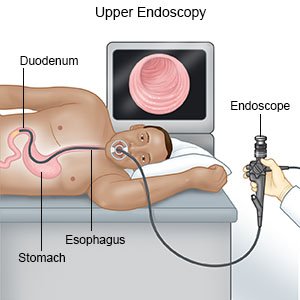Diabetic Gastroparesis
Medically reviewed by Drugs.com. Last updated on Aug 4, 2025.
Diabetic gastroparesis is a type of nerve damage that slows digestion. High blood sugar levels from diabetes can damage nerves and tissues in your stomach. The damage prevents your stomach from emptying normally. Gastroparesis is also called delayed gastric emptying.
 |
WHILE YOU ARE HERE:
Informed consent
is a legal document that explains the tests, treatments, or procedures that you may need. Informed consent means you understand what will be done and can make decisions about what you want. You give your permission when you sign the consent form. You can have someone sign this form for you if you are not able to sign it. You have the right to understand your medical care in words you know. Before you sign the consent form, understand the risks and benefits of what will be done. Make sure all your questions are answered.
An IV
is a small tube placed in your vein that is used to give you medicine or liquids.
A dietitian
may work with you to create a meal plan that will help you control your blood sugar. Ask how your favorite foods may fit into this meal plan. Ask your healthcare provider for more information about meal planning.
Related medications
Medicines:
- Nausea medicine helps calm your stomach and prevent vomiting.
- Motility medicines help your stomach muscles move food and liquids out of your stomach faster. These medicines also may help you digest food better.
- An antibiotic may be given for a short time to help your stomach empty more quickly.
Tests:
- A gastric emptying breath test (GEBT) will show how fast food moves from your stomach to your small intestine. The test measures the amount of carbon in your breath after you eat a meal prepared by healthcare providers.
- An x-ray or ultrasound may show how your stomach is working. You may be given a chalky liquid to drink before the pictures are taken. This liquid helps your stomach and intestines show up clearly on the monitor.
- An endoscopy may show what is causing your digestive problems. A scope is used to show images of the inside of your stomach. A scope is a thin, bendable tube with a light and camera on the end. Samples may be taken from your digestive tract and sent to a lab for tests.

- A scintigraphy , or gastric-emptying scan, measures how quickly food moves out of your stomach. A slightly radioactive substance is placed in food. The amount of radiation is small and safe. You eat the food and then lie under a machine that takes pictures of the food inside your stomach. Pictures will be taken every 15 minutes, up to 4 hours after you eat, or as directed.
Treatment:
- A feeding tube may be needed if your stomach cannot process food. You may need the feeding tube for a short time, until your stomach starts working properly. You may instead need a long-term feeding tube if your gastroparesis is severe. Ask for more information about feeding tubes.
- Stomach stimulation may be helpful if your symptoms are severe and other treatments do not work. Surgery is needed to implant a device in your abdomen. The device sends mild signals to the nerves and muscles in your stomach to relieve nausea and vomiting.
Treatment options
The following list of medications are related to or used in the treatment of this condition.
RISKS:
Slowed digestion may make your blood sugar levels hard to control. Your condition may worsen, and you may develop more severe symptoms. Bacteria can grow in food that sits in your stomach too long and make you ill. Food can also harden in your stomach if it sits too long, and cause blockages, vomiting, and nausea. Severe gastroparesis may lead to vomiting that impairs your daily life. Slowed digestion and vomiting may also dehydrate you. This could decrease how much you urinate, and dry your skin and mucous cells. Gastroparesis may also damage your intestines.
CARE AGREEMENT:
You have the right to help plan your care. Learn about your health condition and how it may be treated. Discuss treatment options with your healthcare providers to decide what care you want to receive. You always have the right to refuse treatment.© Copyright Merative 2025 Information is for End User's use only and may not be sold, redistributed or otherwise used for commercial purposes.
The above information is an educational aid only. It is not intended as medical advice for individual conditions or treatments. Talk to your doctor, nurse or pharmacist before following any medical regimen to see if it is safe and effective for you.
Learn more about Diabetic Gastroparesis
- Diabetes Medications and Alcohol Interactions
- FDA-Approved Weight Loss Drugs: Can They Help You?
- OneTouch Blood Glucose Meters
- Side Effects of Weight Loss Drugs
- Top 10 Diabetes Treatments You May Have Missed
- Which Drugs Cause Weight Gain?
Treatment options
- Medications for Diabetes Mellitus
- Medications for Diabetes, Type 1
- Medications for Gastroparesis
- Medications for Type 2 Diabetes
Care guides
- Diabetic Gastroparesis
- Diabetic Hyperglycemia
- Diabetic Neuropathy
- Gastroparesis
- Hypoglycemia in a Person with Diabetes
Symptoms and treatments
Medicine.com guides (external)
Further information
Always consult your healthcare provider to ensure the information displayed on this page applies to your personal circumstances.
